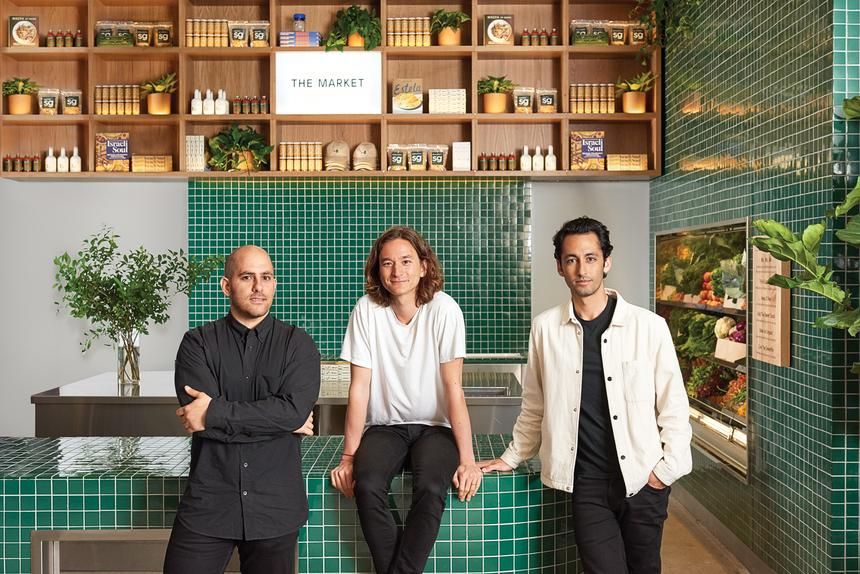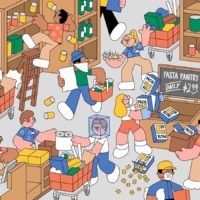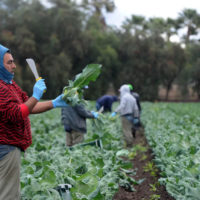
Image Source: Wall Street Journal
Every week we track the business, tech and investment trends in CPG, retail, restaurants, agriculture, cooking and health, so you don’t have to. Here are some of this week’s top headlines.
The failure of the Paycheck Protection Program when independent restaurants and bars learned that they had been passed over as funds went to large chains. Facing criticism, Shake Shack and Sweetgreen both announced that they would be returning their $10 million loans.
Meat packers and big box retailers are continuing to experience an increase in positive coronavirus cases and deaths. In response, Tyson has suspended operations of its largest plant in Waterloo, Iowa. Several grocery stores have converted to online shopping to protect their employees.
Eight states have deemed recreational cannabis essential during Covid-19 shutdowns. Industry executives believe federal legalization of cannabis would provide economic stimulus through tax revenue and job creation during the recovery.
The COVID-19 pandemic has put more than 10 million independent restaurant workers at risk of losing their jobs for good. Across sectors, businesses are being forced to pivot their business models as consumers go on lockdown and change their buying habits. This round-up features many of the ways the pandemic is impacting all parts of the food industry.
In an effort to do our part and support the community we love so dearly, we have compiled a list of resources and organizations that are providing support to those in need. We are also offering free job postings to anyone who is looking to employ people impacted by the COVID-19 pandemic.
- Resources: We have compiled a database of resources for those in the food industry impacted by the pandemic here. Please add your own resources as well.
- Jobs: We need to band together to support everyone across the food system who has lost their job due to the pandemic. Use code “coronavirusfoodjobs” to post remote or remote-friendly food jobs on our job board for free.
We need your support as well. Producing our newsletter takes a lot of time and resources, and we need to change our business model to keep it going. To date, we’ve funded our work through our events, sponsorships and consulting, which are all on hold due to the pandemic. If you find our newsletter to be a valuable resource, we hope you will consider making a one time or monthly contribution, so we can keep the newsletter going and free for those who can not afford a subscription fee. Whether it’s $5 or $500 every bit helps and shows us that you value our work. Not able to contribute right now? You can help by sharing our newsletter with friends and colleagues.
Check out our weekly round-up of last week’s top food startup, tech and innovation news below or peruse the full newsletter here.
1. US Cannabis CEOs Say Coronavirus Crisis Will Speed Up Legalization: ‘We Have Been Deemed Essential’ – CNBC
Cannabis CEOs say federal legalization of cannabis would provide economic stimulus through tax revenue and job creation during the Covid-19 recovery. Eight states deemed recreational cannabis essential during Covid-19 shutdowns.
2. Sweetgreen Returns $10M Loan Meant to Help Small Businesses Survive the Coronavirus Pandemic – Business Insider
Kura Sushi, the largest conveyor belt sushi chain in the US, also announced that it would return its nearly $6m loan.
3. Facing Criticism, Shake Shack Returns $10M Small Business Loan – Eater
Shake Shack’s move to return the funds was met with skepticism, as some questioned why the loan was available to to the chain in the first place.
4. Ruth’s Chris to Repay Federal Small-Business Loan – Wall Street Journal
Steakhouse chain says it will return $20 million in coronavirus relief funds after The Treasury Department asked publicly traded companies to repay loans they received this month from a program intended to aid small businesses hurt by the coronavirus pandemic.
5. COVID-19 | Reopening Critical Path for Independent Restaurants + Bars
A comprehensive critical path laying out foundational tasks to assist restaurants with reopening their doors.
6. Four Georgia Poultry Workers Dead from Coronavirus – ABC News
Tyson Foods has declined to say how many of its workers have tested positive for Covid-19.
7. Tyson’s Largest Pork Plant Suspends Operations Due to Coronavirus Outbreak – Forbes
The plant’s 2,800 employees will continue to be paid, though the company acknowledged that the closure of its plant in Waterloo, Iowa will affect its supply chain of farmers, truckers, distributors and customers.
8. A Portland Whole Foods Employee Has Died of Coronavirus – Eater
Meanwhile, another Portland Whole Foods employee has tested positive for the virus at the Hollywood location.
9. How the Federal $19B Coronavirus Relief Fund Can Help Farmers and Food Producers – Food Dive
The financial support will include $16b in direct payments to farmers and ranchers: $9.6b to livestock, $3.9b to row crop producers, $2.1b to specialty crop producers and $500m for other crops.
10. Help Is On the Way, Restaurants Are Told. But Will It Work? – New York Times
Owners of many small, independent restaurants were passed over by a federal loan program. Now they fear that a new round may not solve their problems.
11. ‘Instead of Coronavirus, the Hunger Will Kill Us.’ A Global Food Crisis Looms. – New York Times
The world has never faced a hunger emergency like this. It could double the number of people facing acute hunger to 265m by the end of this year.
12. Majority of Grocery Workers Lack Access to Paid Sick Leave – Grocery Dive
The expansion of paid sick leave for employers with more than 500 employees has left 85% of essential employees in the grocery, pharmacy and general merchandise industries without mandatory access to Covid-19 related sick leave benefits.
13. I Harvest Your Food. Why Isn’t My Health ‘Essential’? – New York Times
All workers, regardless of immigration status, deserve emergency income and health care. For those of us still on the job, we need enforceable health and safety protections and hazard pay—not lower wages—to compensate us for the risks we are taking to protect our country’s food supply.
14. Chipotle to Pay $25M Criminal Fine for Food Poisoning – Bloomberg
The fast casual chain will pay a $25m criminal fine to resolve allegations by federal prosecutors that its food sickened more than 1,100 people across the US from 2015 to 2018.
15. Hunger Relief Will Come in the Form of the ‘Harvest Box’ – The Fern
The government will spend $300m a month to buy fresh produce, dairy and meat products that will be packaged into a box for food banks and other charities. Some $3b will be spent on purchases of surplus foods for donation.
Our newsletter is the absolute easiest way to stay on top of the emerging sector, so sign up for it today and never miss the latest food tech and innovation news and trends, Already signed up? Share the love with your friends and colleagues!
Related Posts
 Trump Taps Big Chains and Fine Dining Chefs for COVID-19 Economic Council, 200K+ Citizens Enlist to Help French Farmers + More
Trump Taps Big Chains and Fine Dining Chefs for COVID-19 Economic Council, 200K+ Citizens Enlist to Help French Farmers + More Fish Industry Loses 85% of Revenue, Dairy Industry Expects to Loose $5-10B in Sales + More
Fish Industry Loses 85% of Revenue, Dairy Industry Expects to Loose $5-10B in Sales + More Coronavirus Threatens World’s Food Supply, Online Grocery Order Volume Surges 193% + More
Coronavirus Threatens World’s Food Supply, Online Grocery Order Volume Surges 193% + More


